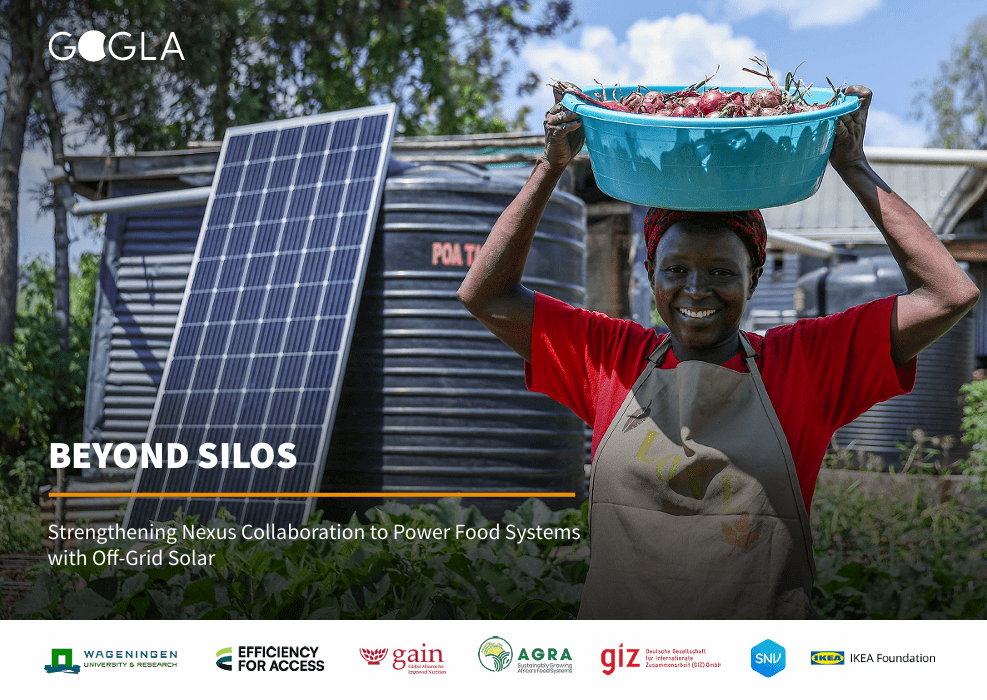Beyond Silos: Powering Food Systems with Off-Grid Solar
 |
Strengthening the Nexus Collaboration
rapport Mar 2025 ; 40 pages
Aut. Bas Hetterscheid & Sarah Alexander & Jakub Vrba & Anne Waburi
Ed. GIZ - Eschborn e4a - Washington DC GOGLA - Amsterdam IRENA - Abu Dhabi SNV - Den Haag
Téléchargeable sous format: PdF
Téléchargeable chez l'éditeur
Résumé:
L’agriculture représente 30 % de la consommation énergétique mondiale et nécessite de l’énergie pour la production alimentaire, le stockage, le transport et la transformation. Globalement, ces activités comptent pour au moins 15 % de la consommation mondiale de combustibles fossiles. Toutefois, en Afrique subsaharienne, le secteur agricole consomme nettement moins d’énergie que la moyenne mondiale, ce qui limite les possibilités de création de valeur, augmente les pertes alimentaires dues à l’insuffisance des infrastructures de stockage et de transformation, et contribue à de faibles rendements agricoles.
Ce rapport souligne l’importance de la technologie solaire hors réseau pour soutenir divers processus du système alimentaire, de l’irrigation à la transformation des produits. Il aborde le déficit énergétique qui freine la productivité d’un grand nombre de petits exploitants agricoles.
En prônant une meilleure collaboration entre les secteurs de l’énergie solaire hors réseau et de l’agriculture, le rapport favorise une meilleure compréhension des priorités et des défis communs. Il recommande de coordonner les efforts pour accélérer l’innovation, renforcer la sécurité alimentaire et rendre l’agriculture plus résiliente face au climat.
Les points clés mettent en évidence la nécessité d’approches intégrées pour maximiser l’impact sur la sécurité alimentaire, ainsi que le rôle du solaire hors réseau dans la réalisation de l’objectif de l’Afrique : augmenter la production agroalimentaire de 50 % d’ici 2035.
Abstract:
Agriculture accounts for 30% of global energy consumption, and requires power for food production, storage, transportation and processing. All of which account for at least 15% of global fossil fuel use. However, in sub-Saharan Africa, the sector consumes significantly less energy than the global average, limiting opportunities for value addition, increasing food waste due to inadequate storage and processing facilities, and contributing to low agricultural yields.
This report highlights the importance of off-grid solar technology in helping power diverse food system processes, from irrigation to food processing. It addresses the energy gap limiting productivity for a large number of smallholder farmers.
Advocating for better collaboration between the off-grid and agriculture sectors, the whitepaper also helps promote mutual understanding of priorities and challenges. It recommends aligning efforts to accelerate innovation, strengthening food security and making agriculture more climate-resilient.
Key takeaways include the need for integrated approaches to maximise impact on food security and the role of off-grid solar in achieving Africa’s goal of increasing agri-food output by 50% by 2035. Sommaire:
Key Definitions .........................................................................4
About the Paper .........................................................................5
Objectives of the Paper ..............................................................6
Scope of the Paper ....................................................................7
Structure of the Paper ................................................................8
Limitations of the Paper .............................................................8
Chapter 1: Introduction .............................................................9
Why is the Food Systems and Energy Nexus Important? ..........9
What is the Potential for Off-Grid Solar (OGS) within the Nexus?...9
How do Interactions within the Nexus Impact the Viability of OGS Solutions? ...10
Chapter 2: Analysis of the Food Systems and Energy Nexus .........12
What are the Stakeholder Perspectives within the Nexus? .....12
How can Stakeholders Achieve Collaboration within the Nexus? ...13
What are some of the Initiatives Designed to Converge Stakeholders towards Nexus Programming? ...15
Chapter 3: Off-Grid Solar Applications Powering Food Systems....16
Irrigation ..........................................................................16
Cooling .............................................................................21
Agro-processing ................................................................25
Chapter 4: Adopting a Nexus Approach to Scaling Off Grid Solar Applications in Food Systems ...28
Integrated Planning ...........................................................28
Access to Finance ...............................................................30
Business Model Innovation .................................................31
Market Access ....................................................................32
Regulation and Policy Coherence .........................................33
Interministerial Coordination .............................................35
Chapter 5: Strengthening the Food Systems and Energy Nexus ....37
Publics-Cibles:
Collectivité , Association , Acteurs de coopération , Ingénieur, concepteur , Economiste , Décideurs locaux ou nationaux
Mots clefs: |
agriculture (CI) (DT) (OP) (ope) , énergie solaire (CI) (DT) (OP) (ope) , usage productif (CI) (DT) (OP) (ope) |
Pays concernés: |
Kenya (CI) (DT) (OP) , Ouganda (CI) (DT) (OP) , Sénégal (CI) (DT) (OP) , Tanzanie (CI) (DT) (OP) |
Editeurs/Diffuseurs: |
|
GIZ
-
Deutsche Gesellschaft für Internationale Zusammenarbeit - Eschborn - Allemagne |
e4a
-
Efficiency for access - Washington DC - Etats Unis |
GOGLA
-
Global association for the off-grid solar energy industry - Amsterdam - Pays Bas |
IRENA
-
International Renewable Energy Agency - Abu Dhabi - Emirats Arabes Unis |
SNV
-
Organisatie voor ontiwkkelings samenwerking en bewustwording - Den Haag - Pays Bas |
En cas de lien brisé, nous le mentionner à communication@pseau.org